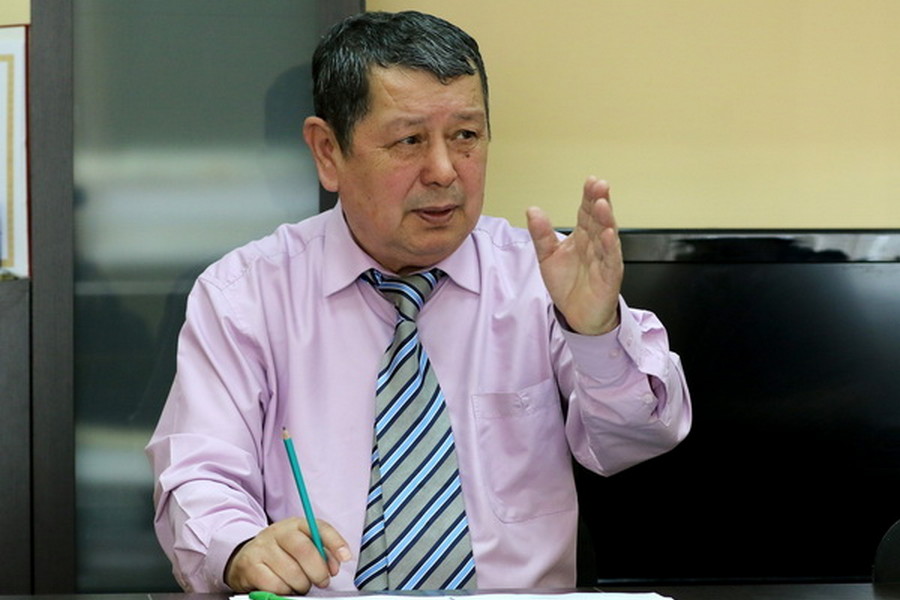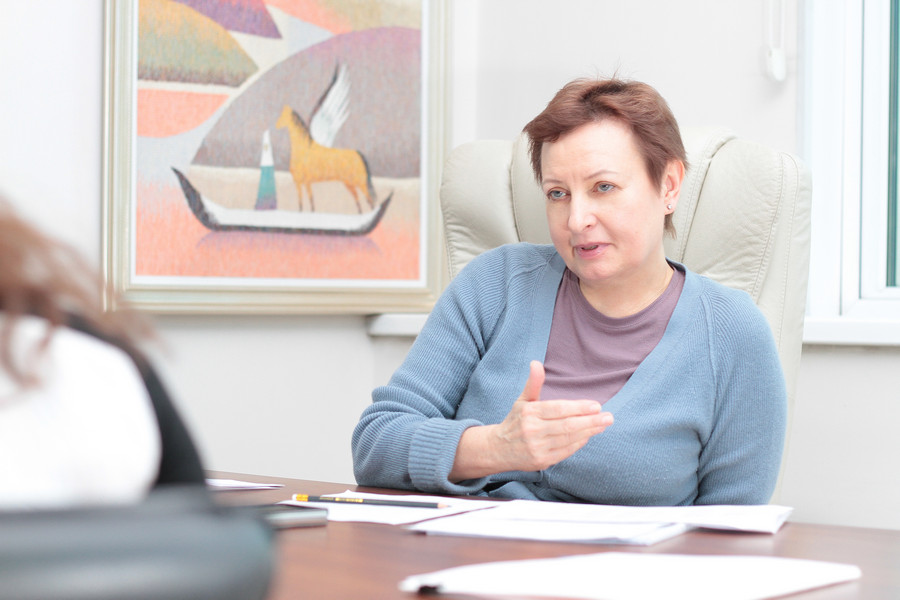President of the Union of Kazakhstan's Poultry Farmers Ruslan SHARIPOV:
THE MOST IMPORTANT THING FOR US NOW IS NOT TO REDUCE THE PRODUCTION RATE

Negative factors in the economy have brought their adjustments into the poultry business. This year a number of poultry plants have been closed down in Kazakhstan, many enterprises have been forced to reduce production. In addition, due to the market being saturated with cheap imported products, poultry meat sales by many Kazakh poultry plants have been almost halved. President of the Union of Kazakhstan's Poultry Farmers Ruslan SHARIPOV told Interfax-Kazakhstan on how the industry managed to retain the rates, which were reached, as well as to expand into new markets.
- How does the industry plan to wrap up the year 2016 by and large? What targets do you seek to achieve?
- At the beginning of the year, the Union of the Poultry Farmers forecast the total poultry meat production of 182,000 tonnes. But, as always, life makes its adjustments. A number of poultry plants have been closed down; the others have reduced the output. And this year, given the current dynamics the poultry meat production will amount to 150,000 tonnes, the total poultry population will be 38 million head, egg production will increase to 5 billion.
The most important [thing] for us now is not to reduce the production rate, on the contrary, to increase poultry meat production and poultry product exports.
In the first 9 months of this year, egg production across all categories of farms amounted to 3.601 billion, or an increase of 0.3% compared to the same period last year; 110,729 tonnes of poultry meat were produced in January-September, an increase of 8.3% compared to the same period last year. The number of poultry also grew by 0.9% to 38.823 million head.
- What are the plans for next year?
- The main objective is to retain the current production rate, expand into new markets. For next year we set ourselves the task to keep egg production flat and increase poultry meat production to 186,000 tonnes.
In 2017 a broiler factory - Aulie-Ata Phoenix LLP - is to be to put into operation in Zhambyl region, the first phase of Makinsk Poultry Plant (Aitas group of companies) is to be commissioned in Akmola region. Each poultry plant expands the production capacity and plans to increase the poultry meat output at the expense of that. The same situation is with egg production.
- What changes have taken place in the industry lately?
- In the past five years production across the whole poultry farming industry has increased in general; the poultry population grew by 8% to 35.6 million head in 2015 from 32.7 million head in 2010, production of commercial eggs rose by 21.2% to 4.7 billion in 2015 from 3.7 billion in 2010, poultry meat production increased by 29.5% to 146,000 tonnes in 2015 from 103,000 tonnes in 2010.
During this period, all the poultry farms were re-equipped, their equipment was upgraded, the production capacity expanded.
- What was done well, namely, and what performance are you not quite satisfied with?
- We consider the production growth an achievement. It is no secret that during the last decade the poultry industry was on the brink of bankruptcy. Thanks to the government support, as well as skills to do business, poultry farming shows positive dynamics. Of course, no one should be satisfied with what was already achieved; it's necessary to develop further, to move from simple production to deep processing of table eggs and meat poultry thereby increasing the range of products.
- Is the opening of new production facilities expected?
- Yes, of course. The opening of the first phase of the broiler plant (Makinsk Poultry Plant) is planned for next autumn in Akmola region. This is a project being implemented within the framework of the long-term development strategy of the Aitas group of companies with the support of the EBRD and the fund CITIC. The construction of the poultry plant started in 2015 in the town of Makinsk of Akmola region. The project value is 40 billion tenge and this makes it the largest investment project in the industry. The plant would produce 60,000 tonnes of products per year.
- What problems is currently the industry facing?
- The poultry industry's breeding base is extremely poor; the lack of floating capital, feed; feed, premixes, vaccines, vitamins are expensive.
To this end, we propose to increase subsidies by 2-3 times, as well as make adjustments to include subsidies for waterfowl meat (goose and duck meat), and so that the subsidies provided be targeted. To subsidize: vaccines against especially dangerous contagious diseases, activities to diagnose diseases of birds, purchases of premixes, vitamins and other biological additives. To create a 1st grade poultry and egg breeding reproduction facility with the government support, to build two [reproduction] centers in the southern region and another two in the northern region. It is necessary to expand investment subsidies to cover the plant construction expenditure, for poultry breeding reproduction facilities, for the deep processing of eggs and poultry meat; for poultry plant waste recycling.
- You have recently raised the issue of the necessity of extending subsidies for the poultry industry. Has the government backed you on this matter?
- Yes, we have raised this issue in the Agriculture Ministry. As you know, currently the state authorities are drafting a new program for the agricultural complex as instructed by the head of state, which envisages reducing subsidies for table eggs but increasing subsidies for poultry meat production and poultry breeding. The Agriculture Ministry has pledged to take our proposals into consideration.
- What hampers productive work? Tell, please, in more detail.
- The prices are our problem. We have repeatedly voiced that now the poultry plants sell their products below or at cost price. All of the components - public utility services, transportation costs, electricity, water, feed, premixes and many more - doubled or tripled in price, the feed wheat price increased by 61%. In addition, the devaluation [of the tenge] made credit commitments more expensive: it is no secret that all the foreign-made equipment was purchased in foreign currencies.
However, the poultry plants cannot raise the prices as the inspection bodies begin an investigation straight away.
At the same time middlemen buy products from manufacturers at a lower price and sell at a higher price. We propose to prohibit middlemen and other trade organizations from reselling our products at a price higher than 15-20% of the manufacturer’s wholesale price.
- What is the current situation with the product sales?
- The share of imports in our industry is still high. We import almost 50% of poultry meat. For example, in 2015 Kazakhstan consumed 320,000 tonnes of poultry meat, of which domestic manufacturers produced 146,000 tonnes.
The main competitors of Kazakhstan’s poultry-farming enterprises are, of course, Russian [companies]. We are forced to sell [on the local market] below their prices in order for them not to enter our market. They produce large volumes, which are not comparable with ours. They have their own breeding reproduction and production centers, and in addition, our neighbors enjoy good state support. Statistics show that, due to the market saturation with cheap imported products since the beginning of the year, poultry meat sales by Kazakhstan’s many poultry plants have been almost halved. But we are trying to stay afloat, seeking to expand into neighboring countries across the border; our domestic production is in high demand in the CIS countries.
Thus, domestic poultry farms producing eggs have managed to enter foreign markets for the first time in the last decade. This is, in the first instance, Russia, Tajikistan, Kyrgyzstan, Afghanistan, the United Arab Emirates, with turkey meat exported to Moscow (Russia) and Kyrgyzstan. And this encourages us very much.
- Thank you for the interview.
November, 2016
© 2025 Interfax-Kazakhstan news agency
Copying and use of these materials without reference to the source is prohibited
Archive






